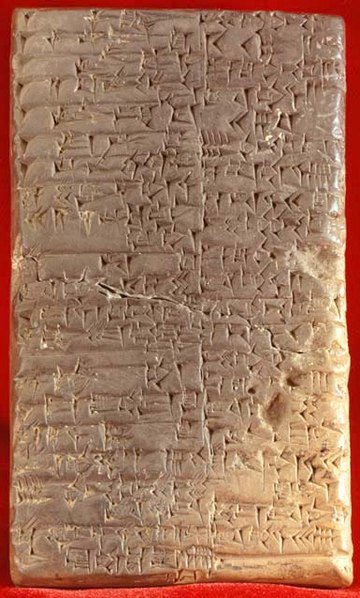Oriental literature in the antiquity // Mesopotamia // Analysis

Cuneiform writing, source of image of mastery of Wikimedia Commons
For the Mesopotamian peoples his philosophy the origin of the world is a result of the interaction of two beginning, the masculine one, Apus, which gave birth to the firmament and to the waters, the feminine beginning, Tiamat, the ground, the essential mud from which the creatures arose, to the beginning monstrous. Of the union of both beginning the gods were born; Anun, master of the sky, Ea that was governing the waters, Enlil, divinity of the ground, in practice was the last one the principal god, since in his domains the country of Sumer was located and prospered.

Evolution of the ideogram ‘ head ‘, of 3000 to 1000 B.C., source image of mastery of Wikimedia Commons
The poem we meet Sumerian of the creation across a later version and incomplete, in acadio, contest in seven auto tags and graduates Enuma elish, chronologically previous is another text, more brief and very incomplete, that narrates the deluge, which swooped down on Sumer, in the aparecen the gods, who name in the poem of the creation more other divinities, and in any case the importance of the water stays of manifesto, as dadora of life in that culture based on the irrigation.
Very little is what survives of the Mesopotamian literature, which did not have an aesthetic purpose but rather of exaltation of the religious faith and of the political power, the most important work has to of going back a XVIIIth century B.C., they are poems of the creation and the poem of Gilgamés. The poem of the creation, that auto tag of cuneiform writing has come up to us in seven, tries to give an explanation and arrangement of the world, he narrates the struggle between the gods, with the victory of the god Marduk, who creates the sky and the ground, later it shapes the man with his blood.
points of contacts have been observed between this poem and the Biblical story, the Gilgamés is a species of epic, which protagonist is the king of Uruk, a big warlike king, who is partly a god and partly man, to the death of his friend Enkidú, Gilgamés goes in search of a wonderful country where there grows a plant that grants the immortality, it obtains the plant, but a snake snatches it; the hero knows then that he will die, as the rest men. The poem ends with a dialogue of this one with dialogue between Gilgamés and the spectrum Enkidú, a part of this work offers a special interest, it is a question of the poem of the deluge, which shows true resemblance with the Biblical passage of Noé.
Bibliographical source
Michalowski, Piotr (2004). « 2. Sumerian ». In R. D. Woodard. The Cambridge Encyclopedia of the World's Ancient Languages. Cambridge University Press pp. 19-59. ISBN 0 521 56256 2.
The origins of the writing - Page 47 for Wayne M. Senner - 1992.
Mesopotamia - Page 26 for Julian Reade - 1998.

Congratulations @clawfinger! You have completed the following achievement on the Steem blockchain and have been rewarded with new badge(s) :
Click here to view your Board of Honor
If you no longer want to receive notifications, reply to this comment with the word
STOPDo not miss the last post from @steemitboard:
Congratulations @clawfinger! You have completed the following achievement on the Steem blockchain and have been rewarded with new badge(s) :
Click here to view your Board of Honor
If you no longer want to receive notifications, reply to this comment with the word
STOPTo support your work, I also upvoted your post!
Do not miss the last post from @steemitboard: